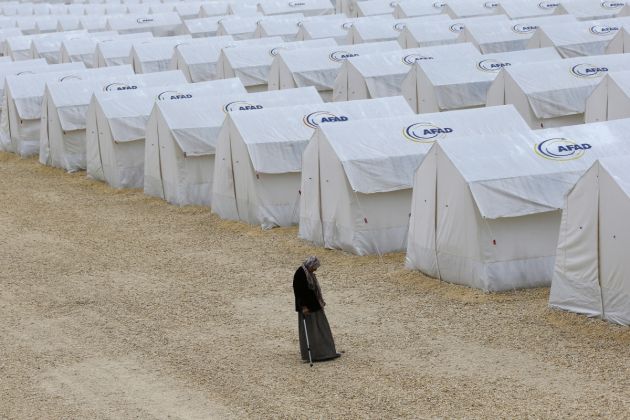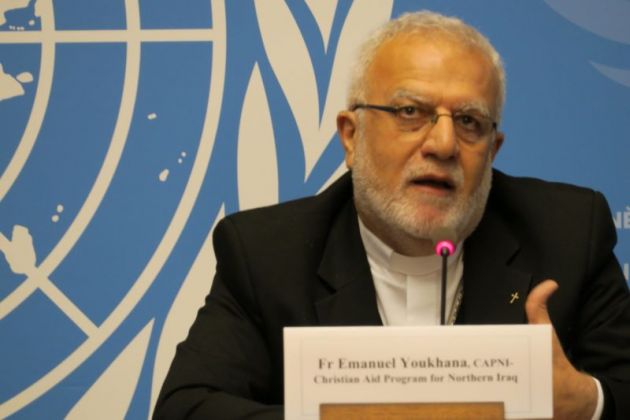For a third year: 'No Christmas bells in Mosul,' says Assyrian priest

For a third Christmas in a row, the church bells will not ring in Mosul, Father Emanuel Youkhana laments.
He recounts that around June 2014 the numerical religious minorities such as Yazidis and Christian around Iraq's second biggest city began to face a horrific onslaught by the group calling itself IS (Islamic State), or Daesh in Arabic.
Mosul was once one of the major centers of Christianity in Iraq and it had once again become a place of genocide against them, he said.
"Since October this is now the second month of liberation," said Emanuel, but he said much apprehension still remains for what will happen after IS is defeated militarily.
"As pleased as we are that our homelands from which thousands of Christians were forced to flee from the extremists, are being retaken, we are very concerned about what lies ahead," Father Emanuel said at the United Nations in Geneva on 12 December.
Archimandrite Emanuel Youkhana, leader of the Assyrian Christians and head of CAPNI (Christian Aid Programme Northern Iraq), spoke at a 12 December press conference and later at a seminar about a report of the World Council of Churches (WCC) and Norwegian Church Aid (NCA), a member of the ACT Alliance.
'PROTECTION OF MINORITIES' REPORT
The report, which was first released in Oslo on 28 November, is titled, "The Protection Needs of Minorities from Syria and Iraq". It was funded by the Norwegian Ministry of Foreign Affairs.
"We were quite sure that we would one day be enabled to go home to our towns and villages. We live in this hope," Emanuel said.
Many of Iraq's religious minorities live in the north, including Christians and Yezidis.
The Assyrian Christians who constitute the most populous Christian group in Iraq speak their own languages and do not necessarily identify as Arab, the report explains.
Consequently, they regard themselves, and are regarded by others, as a distinct ethnic group.
The Yezidis are predominantly Kurdish speaking, with homelands in Iraq and the Kurdistan region of Iraq. Since 2003, much of the Yezidi homeland of Sinjar has been under the control of the Kurdish Regional Government (KRG), although it officially remains under the jurisdiction of the central government of Iraq.
While many Yezidis are willing to identify as Kurds, they see themselves as a distinct ethnic group but they have faced turmoil under IS and even before that as they have been "totally unjustifiably accused of being devil worshippers".
Emanuel reiterated that Christian leaders in Iraq estimate that, as of November 2016, there are fewer than 250,000 Christians remaining in the country.
According to estimates in the WCC-NCA report around 70 percent of the Christians in Iraq have left the country since 2003 and most of those who remain are internally displaced.
Emanuel showed photos he had taken of damage in Christian areas and he said that regretfully sectarian messages had been painted on some of the walls by members or the Iraqi national arm fighting Iraq.
He even noted there were German messages sprayed on the walls, "put there by German Jihadis".
"As much as we are pleased that the military operation have started we hope there will not be attempts by the victors to change the demographics of the area," said Father Emanuel.
"We may not be able to restore the Christian demography [as it was before] but we can restore the Christian values and add value to this place," said the Assyrian church leader.
He noted that there were a number of main religious and ethnic minorities around Mosul – the Iraqi indigenous community; the Jewish community; the Mandians or followers of John the Baptist, the Yazidis and the Christians.
'IN IRAQ BEFORE ARABISATIZATION'
"They all lived in Iraq before Arabization."
None of these peoples had been introduced in the Iraqi school curriculum.
"We were even neglected before Daesh came to uproot us physically. I don't want this to be repeated."
He said that over 100 years, three generations of his family had faced genocide attempts – first under the Ottomans, then after the formation of the Iraqi State in 1933 and now the latest attempt by IS.
Peter Prove, the director of the WCC's Commission of the Churches on International Affairs said that Iraq faces a "litmus test" after the fighting for Mosul ends. "Society diversity is the best bulwark against sectarianism."
IRAQI MISSION STATEMENT
A representative of the Iraqi misssion to the U.N. in Geneva read out a statement in which he said, "The report quoted one Chaldean religious leader stating that "Christians are not only part of the history of this land, but also need to be part of its future. I could not find more fitting words to describe the position of the Iraqi government regarding the future of the country.
"We view the liberation of the areas occupied by ISIS, as paving the way to achieve a future that is shared by all Iraqis and belongs to all of them equally.
"Establishing social and political reconciliation by combating radical ideology and sectarian prejudice is an important goal that the political process in Iraq endeavors to achieve, through education, provision of public services, and allowing wider political participation by all Iraqis especially members of minority groups."
He, however, crticized Emanuel's statment about Iraqi troops spraying sectarian messages on Christian establishment walls arguing "those soldiers have shed their blood in order to liberate the areas inhabited by minorities including Christians."
